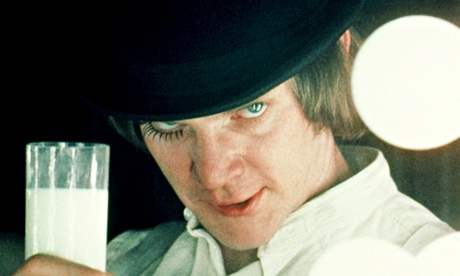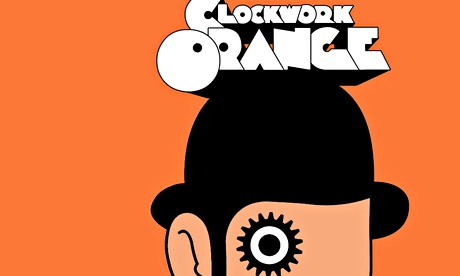Alex from A Clockwork Orange is one of fiction’s indelible delinquents. The milk-sipping, bowler-hatted, ultraviolent droog has become an unlikely style icon for everyone from Usher to Kylie, while Bowie employed the book’s street-slang Nadsat on his final album Blackstar. In cinema, Reservoir Dogs and Heath Ledger’s Joker are just two examples that channel A Clockwork Orange’s uneasy scenes of gleeful menace.
Stanley Kubrick’s vivid 1971 movie ensured A Clockwork Orange became a pop cultural touchstone, but its wildly inventive dystopia was all there in Anthony Burgess’s original novel, published in 1962. It’s the work Burgess remains best-known for, although he considered it an outlier in his prodigious career.
Born in 1917, John Anthony Burgess Wilson grew up above an off licence in Manchester’s Moss Side. His tobacconist father was also a pianist who’d once played with Charlie Chaplin; his mother was a singer who died of Spanish flu when he was just one year old. By his own account he was ignored by his boozing father and his stepmother, demonised in his Enderby novels. Despite these setbacks, he was reading Don Quixote at ten and composing modernist music at 13.
Anthony Burgess began writing poetry as an undergrad at Manchester University (six of his verses have been transformed into a song cycle for MIF by composer Raymond Yiu) but didn’t publish his first novel, Time for a Tiger, until he was 39. Gathering speed, he would go on to publish 32 more novels, plus several books on literature and linguistics, screenplays, music and superhuman quantities of reviews.
Burgess’s punishing schedule for fiction was 1000 words a day, seven days a week. Inside Mr Enderby was originally published under a pseudonym in case his breakneck output at the time – six novels in three years between 1959 and 61 – made him seem like a hack. Amazingly, he managed this with a shopping list that included 12 bottles of gin a week plus several bottles of wine for dinner with his first wife Lynne (her assault by American GIs in wartime London inspired A Clockwork Orange). He made his tea with five bags per cup.
Burgess distanced himself from Kubrick’s film of A Clockwork Orange, perplexed that this “very minor work” was the one people always wanted to know about. Yet its themes – rooted in his Catholic upbringing – of free will, sin and the wrong-headedness of forced reform, run throughout his life and work. Bucking received wisdom, not least the supposed link between high art and improvement of the soul, Alex is a Beethoven-loving thug. Enderby is the other side of the coin, a flatulent slob poet who pens his verse on the loo.
Burgess was enamoured enough with his own comic creation to bash out four Enderby novels between 1963 and 84. In celebration of Burgess’s centenary, Manchester international festival will premiere two new films by Graham Eatough and Stephen Sutcliffe – a reminder of how fun and daring the books could be, playfully using time travel and parallel universes to question what artists leave for posterity.
Burgess was aware that his own legacy would be mottled. He orchestrated his life like a music hall compere in two jaw-dropping autobiographies. His most delicious sentences mix eloquence with pungent filth. He liked to experiment with language, but he also knew how to deliver rollicking reads. Though a pioneer of socialist educational projects, as a wealthy writer he became, notoriously, a UK tax exile.
In Burgess’s eyes, he was a sort of anarchist – an idea that’s certainly borne out in his writing. One of the best descriptions of his work was coined by Burgess himself, reviewing his own pseudonymous novel Inside Mr Enderby in The Yorkshire Post (a stunt that earned him the sack): “How thin and under-savoury everything seems after Enderby’s gross richness.” Gross richness is about right. In books as in life, Burgess really knew how to pack it in.
- No End to Enderby is at The Whitworth, 30 June-16 July
- The World Was Once All Miracle is at The Bridgewater Hall, 4 July.
- The Guardian is a media partner of Manchester international festival.











